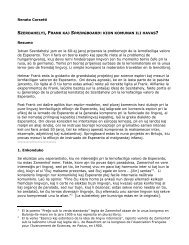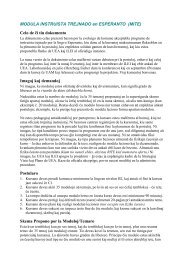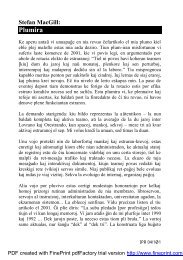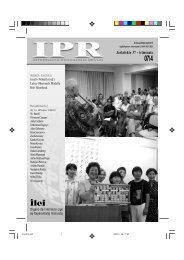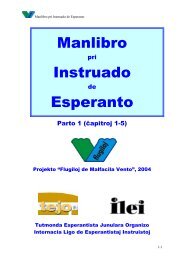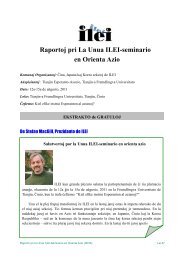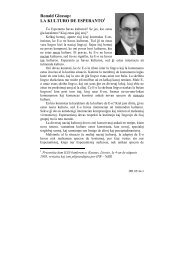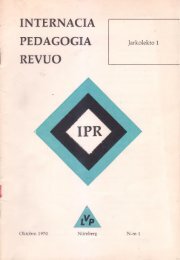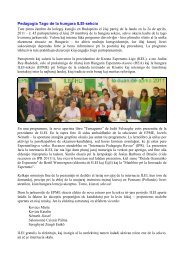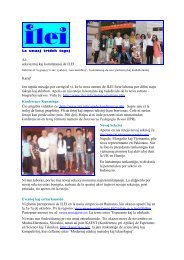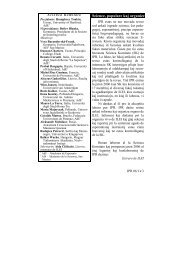Prof. Humphrey Tonkin University of Hartford, USA tonkin ... - ILEI
Prof. Humphrey Tonkin University of Hartford, USA tonkin ... - ILEI
Prof. Humphrey Tonkin University of Hartford, USA tonkin ... - ILEI
You also want an ePaper? Increase the reach of your titles
YUMPU automatically turns print PDFs into web optimized ePapers that Google loves.
Diritti linguistici,<br />
apprendimento delle<br />
lingue ed educazione<br />
per tutti.<br />
Simposio della conferenza<br />
internazionale dell’ilei<br />
27 luglio 2006<br />
Lingvaj rajtoj,<br />
lingvolernado kaj<br />
edukado por ĉiuj.<br />
Simpozio de internacia Ileikonferenco<br />
La 27an de julio 2006<br />
<strong>Pr<strong>of</strong></strong>. <strong>Humphrey</strong> <strong>Tonkin</strong><br />
<strong>University</strong> <strong>of</strong> <strong>Hartford</strong>, <strong>USA</strong><br />
<strong>tonkin</strong>@hartford.edu<br />
Foreign language study in the United states: questions and<br />
problems<br />
Language policy experts are familiar with the contradictory impulses that push communities<br />
towards insistence on the use <strong>of</strong> their own language with their allophone neighbors and<br />
towards accommodation with their neighbors through the use <strong>of</strong> their neighbors’ languages.<br />
Thus, in the context <strong>of</strong> the European Union or the United Nations, the government <strong>of</strong><br />
France insists on the prerogatives associated with the status <strong>of</strong> French and wherever possible<br />
employs it as a diplomatic lingua franca when engaging with speakers <strong>of</strong> other languages, but<br />
French diplomats accommodate themselves to certain speakers <strong>of</strong> English in order to<br />
conduct business with their anglophone counterparts. In recent years, in the case <strong>of</strong> France,<br />
we have seen a weakening <strong>of</strong> French insistence on the exclusive use <strong>of</strong> French in numbers <strong>of</strong><br />
domains. Thus, increasingly French participants in international scholarly conferences<br />
choose to deliver their papers in English, papers written in English are highly regarded in the<br />
assessment <strong>of</strong> the productivity <strong>of</strong> French scholars, and the learning <strong>of</strong> English in general is<br />
more widespread in France than ever.<br />
While we may argue that this process <strong>of</strong> anglicization is inevitable, the speed with which it is<br />
taking place is a result <strong>of</strong> a trade-<strong>of</strong>f: speakers <strong>of</strong> French are increasingly deciding to follow<br />
the route <strong>of</strong> accommodation rather than the route <strong>of</strong> differentiation, recognizing that they<br />
are less and less able to control the choice <strong>of</strong> language in a given domain and also<br />
recognizing that their own language is less and less understood by foreigners and hence the<br />
substance <strong>of</strong> their message is less and less conveyed to their audience. Faced with a choice
2<br />
between the marginalization <strong>of</strong> their message and the marginalization <strong>of</strong> their language, they<br />
choose the latter. As a result, the process speeds up and French loses ground, primarily to<br />
English, all the faster.<br />
We may argue that this textbook case <strong>of</strong> language shift is essentially an unequal battle<br />
between two languages. The inequality springs in part from the behavior <strong>of</strong> non-native<br />
speakers <strong>of</strong> French and English, who, faced with a choice, are increasingly choosing to invest<br />
in the learning <strong>of</strong> English rather than French. These two languages, traditionally recognized<br />
as the principal lingua francas <strong>of</strong> international discourse, at least in the west, have been<br />
shifting relative positions for the past hundred years or more, as the economic power <strong>of</strong> the<br />
United States has eclipsed that <strong>of</strong> France and as economic activity has become increasingly<br />
internationalized. Thus English has established itself as the primary language <strong>of</strong><br />
international communication and French is rapidly shifting from international currency to<br />
become the national language <strong>of</strong> a nevertheless economically powerful international player<br />
with a rather fragile francophone network that includes French-speaking Canada, so-called<br />
francophone Africa, and various other foci <strong>of</strong> French influence.<br />
On the other side <strong>of</strong> this trade-<strong>of</strong>f are the English speakers. They come in several different<br />
categories. There are at the core the native speakers <strong>of</strong> English. Around them are grouped a<br />
considerably larger number <strong>of</strong> highly competent non-native speakers, some <strong>of</strong> them in parts<br />
<strong>of</strong> the world heavily influenced or formerly dominated politically by Britain or the United<br />
States (anglophone Africa, India, Israel, the Philippines), some <strong>of</strong> them members <strong>of</strong> an<br />
international elite that includes speakers from all parts <strong>of</strong> the world who use English on a<br />
regular basis as one <strong>of</strong> their repertoire <strong>of</strong> languages and who may have studied or lived in the<br />
United States or another English-speaking country. This large group <strong>of</strong> non-native speakers,<br />
now larger in number than native-speakers, can be expected to have a larger and larger<br />
influence on the linguistic development <strong>of</strong> English.<br />
Around this second group is a third less clearly defined group <strong>of</strong> individuals who use English<br />
in a relatively restricted context, or are non-elite members <strong>of</strong> communities where English is<br />
used in some measure as a lingua franca (India, for example). Finally, and beyond them<br />
again, are those learning English, partly in informal settings, but particularly in schools all<br />
across the world. The only countries in the world where English is not a major item <strong>of</strong><br />
instruction in the schools are English-speaking countries (though one might add<br />
parenthetically that in-migration into those countries is producing a rather different<br />
population <strong>of</strong> young people whose English-language needs must be addressed through the<br />
education system). Non-English-speaking countries must invest heavily in English-language<br />
learning in order to remain competitive, and this puts a significant burden, both in financial<br />
terms and in the school day, on schools in these countries. This is time and money that<br />
<strong>of</strong>ten governments can ill afford because economic conditions already disadvantage them in<br />
comparison to the educational investment in Britain or the United States. The process <strong>of</strong><br />
English acquisition is hastened by the avalanche <strong>of</strong> English-language-based cultural products<br />
– films, television programming, videogames, music, books – available throughout the world<br />
in increasingly open markets, and by the expanding network <strong>of</strong> the Internet. The existence<br />
<strong>of</strong> these cultural products creates a strong incentive to master English, which makes the task<br />
<strong>of</strong> language teachers easier, and enhances the likely results <strong>of</strong> their labors.<br />
Under such circumstances, there is precious little need for the average native English speaker<br />
engaged in average international activities to acquire any other languages at all. Indeed, in a<br />
situation in which speakers <strong>of</strong> other languages are accommodating to the use <strong>of</strong> English in
3<br />
international discourse, the use <strong>of</strong> languages other than English by established English<br />
speakers will only lessen the momentum toward the domination <strong>of</strong> English. Philippe Van<br />
Parijs has described the process whereby a single lingua franca is selected for discourse in an<br />
apparently multilingual setting: if the group wishes to include everyone (the desire for inclusion<br />
is the key element here), they choose the “maximin” solution – they accommodate<br />
themselves to the individual with the minimum language repertoire. Thus if four people<br />
speak French and have some knowledge <strong>of</strong> English, and one speaks English but has no<br />
appreciable knowledge <strong>of</strong> French, English becomes the lingua franca. Of course, if the<br />
English speaker has nothing to <strong>of</strong>fer to the dialogue and if the French speakers control the<br />
discourse, the desire for inclusion may fade and the other members <strong>of</strong> the group will revert<br />
to French.<br />
In the larger worldwide discourse <strong>of</strong> affairs, English speakers have a great deal to <strong>of</strong>fer – a<br />
massive economy, a huge cultural base, significant political leverage, scientific knowledge.<br />
They also have a marked liability – a relative inability to speak other languages. Workforce<br />
surveys in Europe consistently show the United Kingdom and Ireland as having the least<br />
linguistically pr<strong>of</strong>icient workforce. Studies <strong>of</strong> language learning in schools show that English<br />
speakers spend less time over shorter periods learning foreign languages. Elsewhere in<br />
Europe, the learning <strong>of</strong> foreign languages at the secondary level is nigh-on universal, and at<br />
the primary level it is extremely widespread. In ninety percent <strong>of</strong> the cases, the language<br />
being learned is English. Although numbers <strong>of</strong> countries require pupils to learn two foreign<br />
languages (among them Denmark, Cyprus, Germany, Lithuania and Poland), the number <strong>of</strong><br />
pupils learning languages other than English has declined in recent years.<br />
What is true <strong>of</strong> elementary and secondary schools is equally true <strong>of</strong> higher education.<br />
English has made marked inroads into higher education not simply as a foreign language but<br />
as a language <strong>of</strong> wider communication. In part in order to compete with English-speaking<br />
universities, more and more European universities are <strong>of</strong>fering courses through the medium<br />
<strong>of</strong> English both to attract students from abroad (including other European countries) and to<br />
prepare their own students in what is regarded as the scientific lingua franca. This trend<br />
began in the 1980s in the Netherlands and Germany but has now spread to much <strong>of</strong> Europe<br />
and beyond. Again, we see a classic case <strong>of</strong> language shift: more and more assessment<br />
processes for departments and teaching staff privilege scholarly articles written in English<br />
over those in other languages. Many citation indexes are English-language-based and<br />
therefore favor articles in English – thereby giving the impression that the English language<br />
dominates scientific citation, whether this is actually the case or not. Thus, built-in biases<br />
hasten the process <strong>of</strong> anglicization.<br />
Advocates for the learning <strong>of</strong> foreign languages in the United States accordingly face huge<br />
odds in their efforts to promote language learning. The arguments that they use fall into<br />
several different categories:<br />
Cognitive arguments. Learning a foreign language involves mastery <strong>of</strong> a communicative<br />
code different from one’s own. This is a valuable exercise in heightening cognitive skills, in<br />
understanding the arbitrary nature <strong>of</strong> signs, and in mastering the manipulation <strong>of</strong> systems.<br />
Arguably, such a process should start early, in the lower elementary grades – and not<br />
necessarily with a view to mastery <strong>of</strong> a language, but rather the development <strong>of</strong> an awareness<br />
<strong>of</strong> the relativity <strong>of</strong> languages. In my own experience, such emphasis on differences among
4<br />
languages, and on languages as systems, is relatively lacking, in part because <strong>of</strong> the narrow<br />
training <strong>of</strong> language teachers. Indeed (and this is a more general point), without a cadre <strong>of</strong><br />
truly competent language teachers, little is achievable at any level. For the most part,<br />
language teachers, if they are competent at all, are competent in a single language or a<br />
number <strong>of</strong> discrete languages: their training gives little attention to the notion that by<br />
acquiring one foreign language one can learn skills that can be applied to the acquisition <strong>of</strong><br />
others.<br />
Cultural arguments. The United States is primarily a country <strong>of</strong> migrants. In order to<br />
understand its culture, one needs to understand the cultures <strong>of</strong> those who made it up, the<br />
ideas and concepts that flowed into the country from other parts <strong>of</strong> the world, the history <strong>of</strong><br />
its constituent peoples. Furthermore, the United States is only one nation among many: it is<br />
important, if only for comparative purposes, to understand how other nations have come<br />
about, what values they espouse, how they live their lives, and how their worldviews and<br />
priorities differ from those <strong>of</strong> the United States. One understands oneself better if one<br />
knows where one came from. This cluster <strong>of</strong> arguments is the most widespread in the<br />
discourse <strong>of</strong> language advocacy in the United States. While the teaching <strong>of</strong> so-called heritage<br />
languages (teaching the languages <strong>of</strong> former immigrants to their descendants) may be<br />
reinforced outside school in the minority communities from which some students come, for<br />
the most part there is little reinforcement outside the classroom – far less reinforcement than<br />
the average non-English-speaking student learning English in, say, a European country will<br />
find outside the classroom. The problem is exacerbated by the widespread assumption, right<br />
or wrong, that in the rest <strong>of</strong> the world “everyone understands English.” Reinforcing this is<br />
the continuing widespread view <strong>of</strong> immigrants and others that their first priority is to learn<br />
English, with the result that their own languages may be degraded or excluded in their family<br />
lives. According to this view, a foreign language is a handicap to be eliminated, not an asset<br />
to be maintained.<br />
Practical arguments. Although the English language is dominant in the United States,<br />
many minority languages are spoken. There is a good chance that young people will benefit<br />
in employment and in other ways from acquiring one or more <strong>of</strong> those languages, Spanish<br />
most particularly, but also such languages as Portuguese or Chinese. The future <strong>of</strong> the<br />
United States will depend, in part, on its ability to manage difference among an increasingly<br />
mobile population. Furthermore, as the United States interacts with its neighbors and<br />
trading partners (French Canada to the northeast, Mexico, Europe, East Asia, Brazil), a<br />
knowledge <strong>of</strong> their languages may benefit Americans and may give them an advantage as<br />
they seek employment or seek to do their jobs better. The focus <strong>of</strong> these arguments on<br />
practical experience brings one face to face with an obvious truth: most <strong>of</strong> the “foreign”<br />
language spoken in the United States is non-standard. The city manager, or superintendent<br />
<strong>of</strong> schools, or hospital <strong>of</strong>ficial, who has studied Castilian Spanish will be at an advantage<br />
over those who have not, but not a particularly big advantage. For the most part, language<br />
teachers have not come to terms with the issue <strong>of</strong> non-standard language and its usefulness<br />
in the classroom or its effect on assessment. Schools do not do well in the teaching <strong>of</strong><br />
language for immediate practical use.
5<br />
Arguments from national priorities. In today’s integrated world, the globalization <strong>of</strong><br />
crime and violence advances in step with the positive aspects <strong>of</strong> globalization. For reasons<br />
<strong>of</strong> national security, the United States must be well equipped to understand the languages<br />
and the attitudes <strong>of</strong> friends and opponents. Without a strong reserve <strong>of</strong> language capability,<br />
the country will be caught short by outbreaks <strong>of</strong> hostility or <strong>of</strong> violence in distant parts <strong>of</strong><br />
the world, or by the need to make new friends and alliances. Such arguments from national<br />
policy play particularly well with funders in Washington, who, aware <strong>of</strong> the need for<br />
language readiness, are eager to invest in programs to achieve it. For their part, language<br />
teachers are eager to play to arguments that will produce funding and accordingly may give<br />
too much support to the notion that language teaching in schools can do much for language<br />
needs in government or the armed forces. But the volatility <strong>of</strong> international affairs makes it<br />
impossible to predict where language needs will next arise. In the past few years, Somali has<br />
come and gone, Pashtu has peaked and is declining, Kurdish has risen, Vietnamese has<br />
fallen. By the time the learner has acquired the language, its relevance has evaporated. Even<br />
major languages pass through peaks and valleys <strong>of</strong> popularity as world affairs shift. One<br />
could certainly make the argument that Arabic will maintain its importance as a language skill<br />
for years to come, or that Chinese will – but tell that to the Russian speaker laid <strong>of</strong>f from the<br />
State Department or the local university.... In this area, as in the first <strong>of</strong> our four clusters <strong>of</strong><br />
arguments, the best way <strong>of</strong> building language skills is by assisting the linguistically talented in<br />
developing language-learning skills in general or in the context <strong>of</strong> a family <strong>of</strong> languages, so<br />
that they can readily acquire a working knowledge <strong>of</strong> a language in minimum time. It also<br />
goes without saying that the United States should overcome its ambivalence about<br />
employing immigrants with native competence in these languages.<br />
Clearly, in the design <strong>of</strong> an educational program, these four clusters <strong>of</strong> arguments point in<br />
contradictory directions. It is worth noting that more or less none <strong>of</strong> them point to actual<br />
mastery, or at least that the most convincing arguments for school-based instruction do not.<br />
A tiny minority <strong>of</strong> students passing through American schools can be said to have mastered<br />
their foreign language or languages. Nor do these clusters <strong>of</strong> arguments <strong>of</strong>fer much<br />
guidance on which languages to teach. Given that the U.S. education system is highly<br />
decentralized, with many curricular decisions being made at the local level, local priorities are<br />
likely to dominate. For example, areas with large numbers <strong>of</strong> Chinese immigrants are likely<br />
to be those whose schools <strong>of</strong>fer Chinese – though schools in affluent areas, where parents<br />
want their children to enjoy an advantage in global employment, may also see Chinese as an<br />
attractive option, perhaps unaware <strong>of</strong> how little Chinese their children are likely to acquire in<br />
the disjointed schedule <strong>of</strong> isolated hourly segments that is typical <strong>of</strong> most schools.<br />
Furthermore, again because <strong>of</strong> the decentralization <strong>of</strong> the system, children who move from<br />
one area <strong>of</strong> the country to another are likely to be left high and dry if they choose a less<br />
commonly taught language, and this dislocation may put them at a disadvantage in acquiring<br />
even the limited knowledge <strong>of</strong> a language required for entry to the more selective<br />
universities.<br />
But the biggest single problem faced by advocates <strong>of</strong> language learning is simply the<br />
dominance <strong>of</strong> English on the world scene. It is hard to convince parents that foreign<br />
language matters, or that it will be useful, or that in itself it is an educationally useful skill.<br />
Fortunately, as the United States’ role in the world has grown, so too has the political<br />
awareness <strong>of</strong> language teachers, who over the past few years have become considerably more
6<br />
sophisticated in articulating the arguments for learning language. In the space <strong>of</strong> a few years,<br />
the American Council on the Teaching <strong>of</strong> Foreign Languages, the principal pr<strong>of</strong>essional<br />
organization <strong>of</strong> language teachers, has gone from a minimally staffed <strong>of</strong>fice in an outer<br />
suburb <strong>of</strong> New York to a well-organized and politically engaged operation in Washington.<br />
The year 2005 was declared the Year <strong>of</strong> Languages in the United States, and politicians and<br />
business leaders flocked to endorse it, among them President Bush himself. The idea was<br />
copied from similar efforts in Europe, to be sure, but it would have been inconceivable a<br />
few years ago.<br />
There are still segments <strong>of</strong> the population that remain suspicious <strong>of</strong> foreign-language<br />
knowledge (there is little doubt that John Kerry’s fluency in French did him no good in<br />
some sectors during the last presidential election). They perhaps harbor unarticulated<br />
feelings, derived from the notion that nationhood and language are near-allied, that fluency<br />
in other languages compromises national loyalty. They also perhaps believe, in line with my<br />
opening argument, that the use <strong>of</strong> foreign language constitutes a concession to the power <strong>of</strong><br />
foreigners when Americans should “stand tall” by speaking their own language. Such<br />
inhibitions have prevented language from gaining a significant position in educational<br />
legislation in Washington: it is not one <strong>of</strong> the basic skills included in the No Child Left<br />
Behind Act, which has unfortunately distorted educational priorities across the country (or<br />
focused them, depending on one’s point <strong>of</strong> view).<br />
Despite all <strong>of</strong> this, overall enrollment statistics present a remarkably healthy picture.<br />
According to ACTFL statistics, at the secondary level (including high school, i.e. grades 7-<br />
12), in the year 2000 some seven million students (33.8% <strong>of</strong> total enrollment) were engaged<br />
in study <strong>of</strong> foreign languages, up from 32.8% in 1994. At the high school level (the final<br />
four years <strong>of</strong> schooling), the percentage was 43.8%, up from 41.9% at any one time. At the<br />
elementary level (K-6), however, the percentage declined: down from a tiny 6.4% to an even<br />
tinier 5%. Spanish was the dominant language: 68.8% <strong>of</strong> all language enrollments at the<br />
secondary level (7-12) were in Spanish, an increase <strong>of</strong> 3.0% over 1994. French was down<br />
1.3% and German and Latin slightly down. Italian, however, was up by a huge proportion:<br />
38%, though on a small numerical base.<br />
The ACTFL survey <strong>of</strong> elementary and secondary education was incomplete: because <strong>of</strong> the<br />
extreme decentralization <strong>of</strong> the system, collecting solid statistics is very hard, and<br />
comparative numbers over time are even less reliable, because <strong>of</strong> changed collection<br />
methods or criteria. The Modern Language Association, which collects data from the<br />
tertiary, university level, is considerably more reliable because the data are more easily<br />
collected from a smaller and less diversified base. Here we see some encouraging<br />
developments. Tables 1a and 1b, below, show gains for almost all languages between 1998<br />
and 2002, with significant gains for Spanish and with a marked increase for Italian, which is<br />
on its way to catching up with German. Percentage increases among minor languages may<br />
be less significant, but the gains for Arabic are notable, as are the significant increases in<br />
Latin, Greek and Biblical Hebrew. There may be many reasons for these shifts, but a<br />
significant revival <strong>of</strong> language learning at the college level seems to be underway, at least for<br />
some languages. The ACTFL statistics for the early years <strong>of</strong> schooling could suggest that the<br />
gains are essentially cyclical: there are drop-<strong>of</strong>fs at the elementary and lower secondary levels.<br />
But these numbers are open to multiple interpretations.
[Source for this and the following tables and figures: Elizabeth B. Welles. 2004. Foreign<br />
language enrollments in United States institutions <strong>of</strong> higher education, Fall 2002. ADFL<br />
Bulletin 35/1-2: 7-26]<br />
7
8<br />
As a corrective to the picture <strong>of</strong> linguistic diversity that these numbers would seem to<br />
present, let us glance at the rise in Spanish enrollments over time, which show significant<br />
growth over all other languages, such that Spanish instruction now exceeds the teaching <strong>of</strong><br />
all other foreign languages combined.<br />
If we look at longer-term trends at the tertiary level, we see a steady rise in absolute<br />
numbers, though if these numbers were rendered as percentages <strong>of</strong> students studying at the<br />
tertiary level the changes would look significantly different: the figures for 1960 represent<br />
16.1% <strong>of</strong> the total student population, while those for 2002 are a mere 8.6%. Nonetheless,<br />
while the overall student population did increase in the years 1998-2002, it did so at a much<br />
more modest rate than the increase in foreign language enrollments. And 8.6%, the<br />
percentage for 2002, is the highest since the survey <strong>of</strong> 1972, so in thirty years.<br />
Of course, none <strong>of</strong> these enrollment numbers tell us anything about what students are<br />
actually learning in the classroom, which in many cases is undoubtedly quite minimal, but, all<br />
things being equal, they are encouraging nonetheless.
While no one <strong>of</strong> my acquaintance is announcing the disappearance <strong>of</strong> the Ugly American,<br />
and while the numbers contained in this paper, if compared with those for Europe, would be<br />
puny indeed, we should not be quite ready to give up on the alternative answer to the French<br />
dilemma – the building <strong>of</strong> a genuinely multilingual community across the world, in which<br />
communication between languages is balanced by the flourishing cultivation <strong>of</strong> linguistic<br />
diversity.<br />
9



